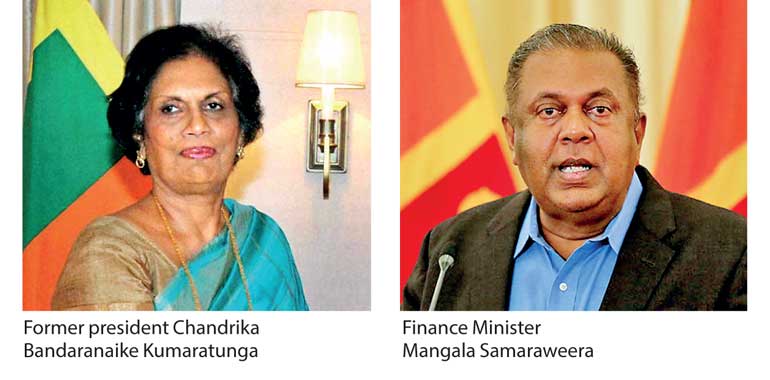Friday Feb 27, 2026
Friday Feb 27, 2026
Friday, 6 April 2018 00:00 - - {{hitsCtrl.values.hits}}
 By Shannon Jayawardena
By Shannon Jayawardena
Former president Chandrika Bandaranaike Kumaratunga and Finance Minister Mangala Samaraweera yesterday emphasised that national reconciliation was a vital pillar in the development and democracy of Sri Lanka.
Speaking at marketing communication firm Bates Strategic Alliance’s Leadership session to mark its 25th anniversary, National Unity and Reconciliation Office Chairperson, former president Chandrika Bandaranaike, said: “We talk about national unity and reconciliation which was a dream and is a dream. I think for the first time in my political life, which extends to about 50 years, three years ago we actually got the chance of attempting to realise that dream because we had a government that was committed to the very purpose. We’ve had governments before that were also committed to it but at the time the political context was not quite conducive.”
She went on to say that for the first time in 2015 Sri Lanka got a real chance of achieving the dream of unity and reconciliation because the two political parties at the time came together to form a government which was totally committed to doing all that was required to achieve everlasting peace and heal the wounds of the war for durable peace.
“We started off well and I must say that we have not had many hiccups in terms of reconciliation and it is a very complicated and complex matter in the Sri Lankan context because not only have we divided societies and communities but also having to repair the war damages through resettlement, rebuilding homes and bringing people together. We are even using arts and culture for it,” added Bandaranaike.
She also stated that now the country had an even better chance of achieving this as it has a Finance Minister who was committed to this purpose and he was one of the first people who was involved in the Sudu Nelum Movement which was formed during her time in the government. The office for reparations is slated to be formed soon along with the truth and reconciliation commission.
Bandaranaike noted: “Slowly but surely we are moving towards achieving these goals and there are not many obstacles but the only thing that is not advancing or growing as it should is the Constitution-making process. Most of the work has been done and this time the Parliament was fully brought into the picture as they handled all of it. It is not moving fast enough. All the political parties in the Parliament have agreed except the Joint Opposition and the democracy is an operating democracy as you cannot get everyone to agree. Like we saw yesterday there is a majority and we could move forward.”
She also added that the final deciding factor for establishing lasting peace was ensuring the rights of minorities through the country’s supreme law which was the Constitution. That has to be done and we all need things to happen very fast. For the first time all the ingredients came together but things will not be easy, Bandaranaike emphasised, asserting that she believes the country has achieved a great deal of progress towards the final objective.
Finance Minister Mangala Samaraweera said: “When the new government was formed in 2015 we actually started moving forward with laying the foundation for a new country on the three pillars which were democratisation, development and the pillar of reconciliation and transitional justice because we felt that that is what we have not been able to achieve for over 70 years since independence. Since we achieved independence we have divided into lines of ethnicity, religion, cast, politics and so forth.”
He added that we have now been given a new life to carry this vision forward. In terms of democracy I would say that we have done very well. Today whatever the shortcomings are, we have a very good country and in terms of governance we are indeed good and it is growing to be a mature democracy. As far as development is concerned, despite the challenges faced, the country is not doing so badly the Minister stated.
Samaraweera elaborated: “The unemployment rate is the lowest in 10 years so again I think that we are going on the right path but we must have commitment to further liberalisation of the economy if are to move forward. Working in two parties sometimes includes people who have rather dated views on how the economy should be run while we could have had the development that our country deserves as many of us refused to accept that Sri Lanka is a multi-religious and ethnical country. We refused to celebrate the diversity of our nation, instead we ended up going into a 30-year brutal war.”
He revealed that he believes this time the country has got its best chance because President Sirisena is committed to reconciliation and so is Prime Minister Wickremesinghe as it was he who initiated the transitional justice process. Former president Bandaranaike has also taken an active role in implementing these ideas at the grassroots level.